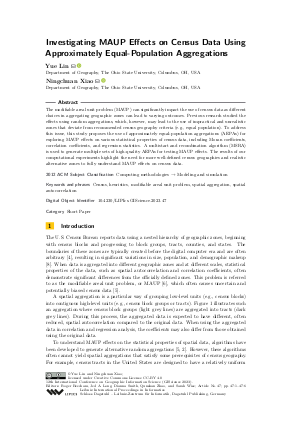Investigating MAUP Effects on Census Data Using Approximately Equal-Population Aggregations (Short Paper)
Authors
Yue Lin  ,
Ningchuan Xiao
,
Ningchuan Xiao 
-
Part of:
Volume:
12th International Conference on Geographic Information Science (GIScience 2023)
Part of: Series: Leibniz International Proceedings in Informatics (LIPIcs)
Part of: Conference: International Conference on Geographic Information Science (GIScience) - License:
 Creative Commons Attribution 4.0 International license
Creative Commons Attribution 4.0 International license
- Publication Date: 2023-09-07
File

PDF
LIPIcs.GIScience.2023.47.pdf
- Filesize: 0.63 MB
- 6 pages
Document Identifiers
Subject Classification
ACM Subject Classification
- Computing methodologies → Modeling and simulation
Keywords
- Census
- heuristics
- modifiable areal unit problem
- spatial aggregation
- spatial autocorrelation
Metrics
- Access Statistics
-
Total Accesses (updated on a weekly basis)
0PDF Downloads0Metadata Views
Abstract
The modifiable areal unit problem (MAUP) can significantly impact the use of census data as different choices in aggregating geographic zones can lead to varying outcomes. Previous research studied the effects using random aggregations, which, however, may lead to the use of impractical and unrealistic zones that deviate from recommended census geography criteria (e.g., equal population). To address this issue, this study proposes the use of approximately equal-population aggregations (AEPAs) for exploring MAUP effects on various statistical properties of census data, including Moran coefficients, correlation coefficients, and regression statistics. A multistart and recombination algorithm (MSRA) is used to generate multiple sets of high-quality AEPAs for testing MAUP effects. The results of our computational experiments highlight the need for more well-defined census geographies and realistic alternative zones to fully understand MAUP effects on census data.
Cite As Get BibTex
Yue Lin and Ningchuan Xiao. Investigating MAUP Effects on Census Data Using Approximately Equal-Population Aggregations (Short Paper). In 12th International Conference on Geographic Information Science (GIScience 2023). Leibniz International Proceedings in Informatics (LIPIcs), Volume 277, pp. 47:1-47:6, Schloss Dagstuhl – Leibniz-Zentrum für Informatik (2023)
https://doi.org/10.4230/LIPIcs.GIScience.2023.47
BibTex
@InProceedings{lin_et_al:LIPIcs.GIScience.2023.47,
author = {Lin, Yue and Xiao, Ningchuan},
title = {{Investigating MAUP Effects on Census Data Using Approximately Equal-Population Aggregations}},
booktitle = {12th International Conference on Geographic Information Science (GIScience 2023)},
pages = {47:1--47:6},
series = {Leibniz International Proceedings in Informatics (LIPIcs)},
ISBN = {978-3-95977-288-4},
ISSN = {1868-8969},
year = {2023},
volume = {277},
editor = {Beecham, Roger and Long, Jed A. and Smith, Dianna and Zhao, Qunshan and Wise, Sarah},
publisher = {Schloss Dagstuhl -- Leibniz-Zentrum f{\"u}r Informatik},
address = {Dagstuhl, Germany},
URL = {https://drops.dagstuhl.de/entities/document/10.4230/LIPIcs.GIScience.2023.47},
URN = {urn:nbn:de:0030-drops-189428},
doi = {10.4230/LIPIcs.GIScience.2023.47},
annote = {Keywords: Census, heuristics, modifiable areal unit problem, spatial aggregation, spatial autocorrelation}
}
Author Details
References
-
Samantha Cockings, Andrew Harfoot, David Martin, and Duncan Hornby. Maintaining existing zoning systems using automated zone-design techniques: methods for creating the 2011 census output geographies for england and wales. Environment and Planning A, 43(10):2399-2418, 2011.

-
A Stewart Fotheringham and David WS Wong. The modifiable areal unit problem in multivariate statistical analysis. Environment and Planning A, 23(7):1025-1044, 1991.

-
Myung Jin Kim. Give-and-take heuristic model to political redistricting problems. Spatial Information Research, 27(5):539-552, 2019.

-
David Martin. Optimizing census geography: The separation of collection and output geographies. International Journal of Geographical Information Science, 12(7):673-685, 1998.

-
Stan Openshaw. A million or so correlation coefficients: Three experiments on the modifiable areal unit problem. In Statistical Applications in the Spatial Science, pages 127-144. Pion, 1979.

-
Stan Openshaw. The Modifiable Areal Unit Problem. Geo Books, Norwich, 1983.

-
Stan Openshaw and RS Baxter. Algorithm 3: A procedure to generate pseudo-random aggregations of n zones into m zones, where m is less than n. Environment and Planning A, 9(12):1423-1428, 1977.

-
Stan Openshaw and Liang Rao. Algorithms for reengineering 1991 census geography. Environment and Planning A, 27(3):425-446, 1995.

- United States Census Bureau. Glossary: Census tract, 2022. URL: https://www.census.gov/programs-surveys/geography/about/glossary.html#par_textimage_13.
-
Ningchuan Xiao, Peixuan Jiang, Myung Jin Kim, and Anuj Gadhave. A multistart heuristic approach to spatial aggregation problems. In International Conference on GIScience Short Paper Proceedings, volume 1, pages 349-351, 2016.

